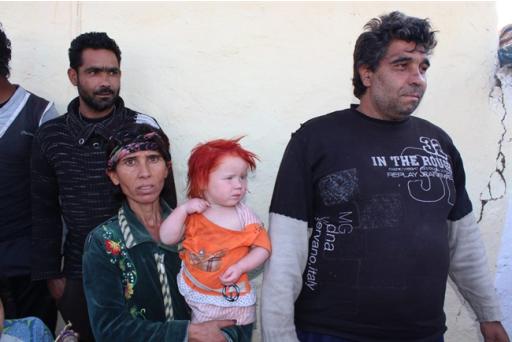What Are Their Chances?
"I like her very much. She looks very much like me, and I want her back home. We will take care of her, and I can help my mother."
Minka Ruseva, 14, Nikolaevo, Bulgaria

Minka Ruseva, daughter of Sasha Ruseva, covers
her face in a Roma neighborhood of Nikolaevo, Bulgaria, Friday, Oct. 25,
2013. Sasha Ruseva, a Bulgarian Roma woman, is under investigation by
Bulgarian authorities trying to find out if she is the mother of a
suspected abduction victim in neighboring Greece known as "Maria" whose
case has triggered a global search for her real parents. (AP Photo/Vadim
Ghirda)
/ AP
"We are very, very happy with this outcome, because we have proved what we said from the outset. ... The adoption, as it happened, was not of a legal nature but it was not abduction."Christos Salis and Eleftheria Dimopoulou experienced the profound misfortune of having their intimate family relations with their five children -- one of whom was informally adopted as a baby -- viciously disrupted by a state authority accustomed to hounding Roma and suspecting them of every manner of brutality and criminality possible to impose upon an ethnic group of huge unpopularity.
Costas Katsavos, lawyer for Christos Salis and Eleftheria Dimopoulou
They had taken in a newborn whom its mother, an impoverished Roma woman working temporarily in Greece from Bulgaria, was unable to take back home with her, out of the goodness of their hearts. They had young children of their own, but they willingly responded to the pleas of the desperate Bulgarian mother of the newborn, to care for the child along with their own, as if she were their own.
And they did just that until government agency workers, noting that the four-year-old child living with the other children of the Greek Roma couple bore no resemblance to them, and leaped to the conclusion that she was with them as a result of criminal child trafficking. Their repeated reassurances that she was their own were ignored, and they were accused of criminality, and jailed.
 |
| The Canadian Press |
There are six million Roma living in Europe. Racist bigotry against them is endemic in the countries of their birth where they are relentlessly slighted, and constantly vulnerable to violations of their human rights. They live in high unemployment, poverty and social dislocation, viewed with distaste for their cultural habits and accused of criminality, their children maltreated and their future prospects dim.
Sasha Ruseva explained she had given birth to a baby girl while in Greece working as an olive picker, but was too poverty-stricken to care for the little girl. She has since given birth to two more children, and is mother to a total of ten. Some of her other children bear a striking resemblance to the child found with the Greek couple. The inference on the little girl's 'discovery' was that she was abducted from some 'white' European family.
Both Greek authorities and the Bulgarian prosecutor's office are trying to establish whether there are grounds to prosecute both parties on the theory that the mother sold the child. Despite that the Greek family love the little girl, raising her as their own, Bulgarian social services say the little girl is to be returned to Bulgaria for adoption. "Maria will first be brought to a family crisis centre, and after, they (authorities) will seek for suitable foster family."
Fourteen-year-old Minka Ruseva, one of the Rusev family's ten children saw pictures of Maria on television and thinks of her as being her sister. In pre-trial incarceration, charged with abducting Maria and committing document fraud, Christos Salis 39, and Eleftheria Dimopoulou 40, plan to seek legal custody of the little girl who has been their daughter for the first four years of her young life.
With so many "authorities" determined to wrest the child from those who love the little girl, one can only wish them the very best of luck.
Labels: Child Welfare, Greece, Human Relations, Roma

<< Home